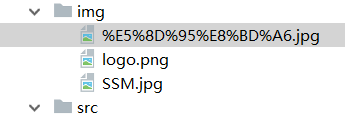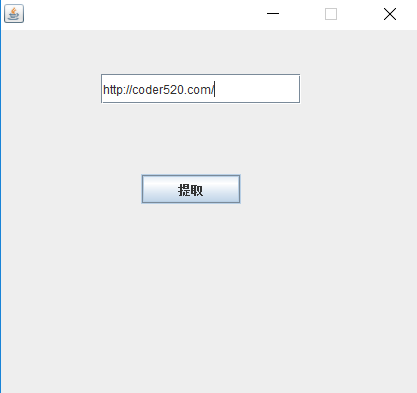首先我们封装一个Http请求的工具类,用HttpURLConnection实现,也可以用HttpClient, 或者直接用Jsoup来请求。
工具类实现比较简单,就一个get方法,读取请求地址的响应内容,这边我们用来抓取网页的内容,没有使用代理,在真正的抓取过程中,当你大量请求某个网站的时候,对方会有一系列的策略来禁用你的请求,这个时候代理就排上用场了,通过代理设置不同的IP来抓取数据。
public class HttpUtils { public static String get(String url) { try { URL getUrl = new URL(url); HttpURLConnection connection = (HttpURLConnection) getUrl.openConnection(); connection.setRequestMethod("GET"); connection.setRequestProperty("Accept", "*/*"); connection.setRequestProperty( "User-Agent", "Mozilla/4.0 (compatible; MSIE 8.0; Windows NT 5.1; Trident/4.0; CIBA)"); connection.setRequestProperty("Accept-Language", "zh-cn"); connection.connect(); BufferedReader reader = new BufferedReader( new InputStreamReader(connection.getInputStream(), "utf-8")); String line; StringBuffer result = new StringBuffer(); while ((line = reader.readLine()) != null){ result.append(line); } reader.close(); return result.toString(); } catch (Exception e) { e.printStackTrace(); } return null; } }
接下来我们随便找一个有图片的网页,来试试抓取功能
public static List<String> getImageSrc(String html) { // 获取img标签正则 String IMGURL_REG = "<img.*src=(.*?)[^>]*?>"; // 获取src路径的正则 String IMGSRC_REG = "http:"?(.*?)("|>|\s+)"; Matcher matcher = Pattern.compile(IMGURL_REG).matcher(html); List<String> listImgUrl = new ArrayList<>(); while (matcher.find()) { Matcher m = Pattern.compile(IMGSRC_REG).matcher(matcher.group()); while (m.find()) { listImgUrl.add(m.group().substring(0, m.group().length() - 1)); } } return listImgUrl; } public static void main(String[] args) { String url = "http://coder520.com/"; String html = HttpUtils.get(url); List<String> imgUrls = getImageSrc(html); for (String imgSrc : imgUrls) { System.out.println(imgSrc); } }
首先将网页的内容抓取下来,然后用正则的方式解析出网页的标签,再解析img的地址。
执行程序我们可以得到下面的内容:
http://ophdr3ukd.bkt.clouddn.com/logo.png http://ophdr3ukd.bkt.clouddn.com/SSM.jpg http://ophdr3ukd.bkt.clouddn.com/%E5%8D%95%E8%BD%A6.jpg
通过上面的地址我们就可以将图片下载到本地了,下面我们写个图片下载的方法:
public static void main(String[] args) throws IOException { String url = "http://coder520.com/"; String html = HttpUtils.get(url); List<String> imgUrls = getImageSrc(html); File dir = new File("img"); if (!dir.exists()) { dir.mkdir(); } for (String imgSrc : imgUrls) { System.out.println(imgSrc); String fileName = imgSrc.substring(imgSrc.lastIndexOf("/") + 1); Files.copy(new URL(imgSrc).openStream(), Paths.get("img/" + fileName)); } }
运行程序图片就被下载下来了

这样就很简单的实现了一个抓取并且提取图片的功能了,看起来还是比较麻烦哈,要写正则之类的 ,下面给大家介绍一种更简单的方式,如果你熟悉jQuery的话对提取元素就很简单了,这个框架就是Jsoup。
jsoup 是一款Java 的HTML解析器,可直接解析某个URL地址、HTML文本内容。它提供了一套非常省力的API,可通过DOM,CSS以及类似于jQuery的操作方法来取出和操作数据。
添加jsoup的依赖:
<dependency>
<groupId>org.jsoup</groupId>
<artifactId>jsoup</artifactId>
<version>1.11.3</version>
</dependency>
使用jsoup之后提取的代码只需要简单的几行即可:
public static void main(String[] args) throws IOException { // String url = "http://coder520.com/"; // String html = HttpUtils.get(url); // List<String> imgUrls = getImageSrc(html); // // File dir = new File("img"); // if (!dir.exists()) { // dir.mkdir(); // } // // for (String imgSrc : imgUrls) { // System.out.println(imgSrc); // String fileName = imgSrc.substring(imgSrc.lastIndexOf("/") + 1); // Files.copy(new URL(imgSrc).openStream(), Paths.get("img/" + fileName)); // } String url = "http://coder520.com/"; String html = HttpUtils.get(url); File dir = new File("img"); if (!dir.exists()) { dir.mkdir(); } Document doc = Jsoup.parse(html); // 提取img标签 Elements imgs = doc.getElementsByTag("img"); for (Element img : imgs) { // 提取img标签的src属性 String imgSrc = img.attr("src"); if (imgSrc.startsWith("//")) { imgSrc = "http:" + imgSrc; } System.out.println(imgSrc); String fileName = imgSrc.substring(imgSrc.lastIndexOf("/") + 1); Files.copy(new URL(imgSrc).openStream(), Paths.get("img/" + fileName)); } }
通过Jsoup.parse创建一个文档对象,然后通过getElementsByTag的方法提取出所有的图片标签,循环遍历,通过attr方法获取图片的src属性,然后下载图片。
下面我们再来升级一下,做成一个小工具,提供一个简单的界面,输入一个网页地址,点击提取按钮,然后把图片自动下载下来,我们可以用swing写界面。
public class App { public static void main(String[] args) { JFrame frame = new JFrame(); frame.setResizable(false); frame.setSize(425,400); frame.setDefaultCloseOperation(JFrame.EXIT_ON_CLOSE); frame.setLayout(null); frame.setLocationRelativeTo(null); JTextField jTextField = new JTextField(); jTextField.setBounds(100, 44, 200, 30); frame.add(jTextField); JButton jButton = new JButton("提取"); jButton.setBounds(140, 144, 100, 30); frame.add(jButton); frame.setVisible(true); jButton.addActionListener(new ActionListener() { @Override public void actionPerformed(ActionEvent e) { String url = jTextField.getText(); if (url == null || url.equals("")) { JOptionPane.showMessageDialog(null, "请填写抓取地址"); return; } File dir = new File("img"); if (!dir.exists()) { dir.mkdir(); } String html = HttpUtils.get(url); Document doc = Jsoup.parse(html); Elements imgs = doc.getElementsByTag("img"); for (Element img : imgs) { String imgSrc = img.attr("src"); if (imgSrc.startsWith("//")) { imgSrc = "http:" + imgSrc; } try { System.out.println(imgSrc); String fileName = imgSrc.substring(imgSrc.lastIndexOf("/") + 1); Files.copy(new URL(imgSrc).openStream(), Paths.get("img/" + fileName)); } catch (MalformedURLException e1) { e1.printStackTrace(); } catch (IOException e1) { e1.printStackTrace(); } } JOptionPane.showMessageDialog(null, "抓取完成"); } }); } }

输入地址,点击提取按钮即可下载图片。